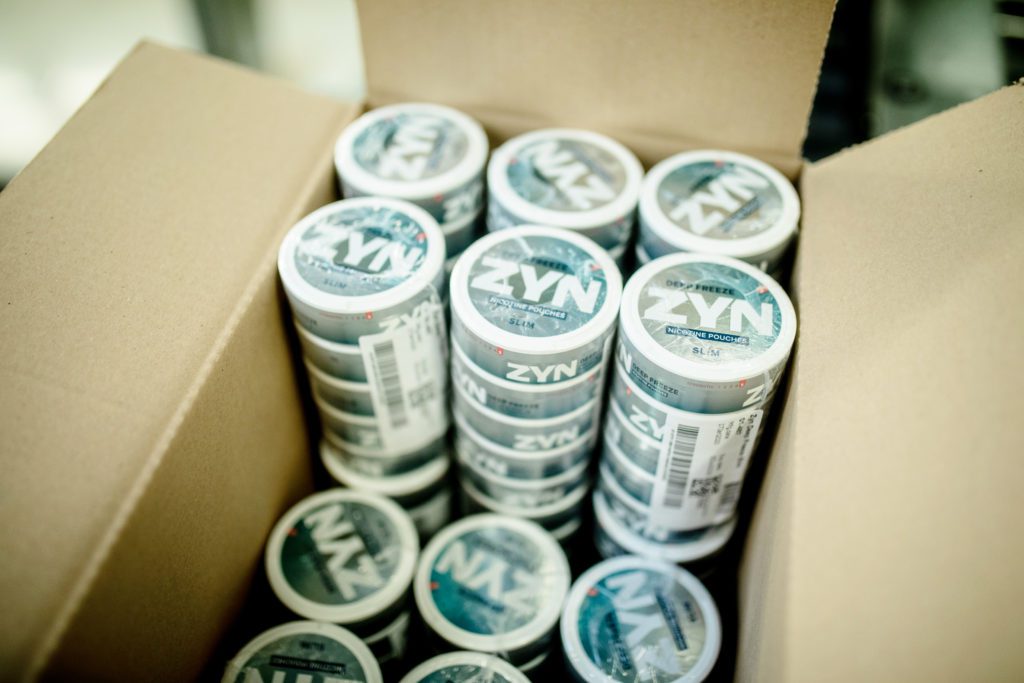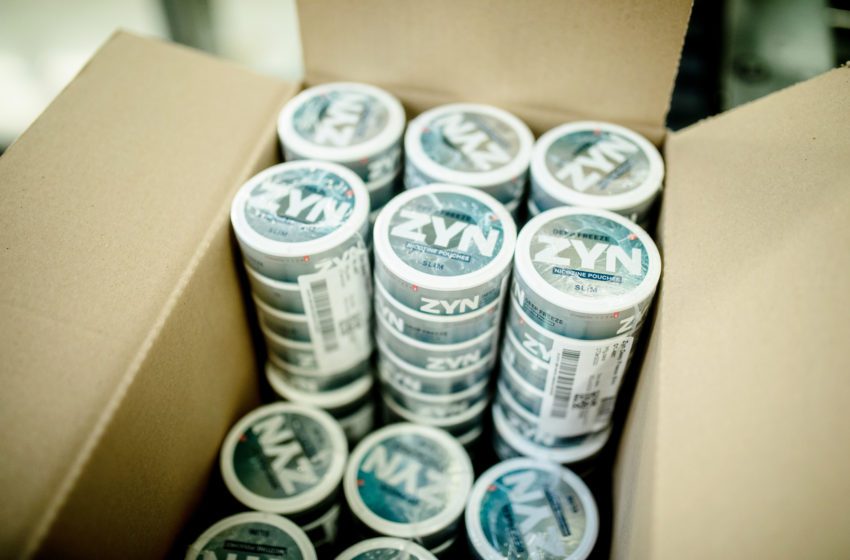
Swedish Match continues to dominate the U.S. nicotine pouch market with its popular Zyn brand.
By Stefanie Rossel
It’s still a fledgling industry but growing rapidly: According to the Foundation for a Smoke-free World (FSFW), nicotine pouches, also known as modern oral products, accounted for an estimated $2.38 billion, or 0.3 percent, of the global retail market in 2021. Toward the end of 2022, the segment had already achieved a value of at least $5.86 billion, estimates Market Reports World. The nicotine pouch market is forecast to expand at a whopping compound annual growth rate of 31 percent until 2028.
Pouches appeal to adult nicotine consumers because they are discreet and spit-free. They can be used in places where cigarettes or vaping products are banned and can be disposed of in household trash after use. Of the global category volume, the five leading modern oral manufacturers jointly hold an 82.1 percent share, according to the FSFW. Swedish Match is the largest player with a share of 48.7 percent, followed by BAT (20.3 percent), Swisher International (6.4 percent), Altria Group (5.4 percent) and Japan Tobacco International (1.4 percent).
Sweden and the United States are the largest markets for nicotine pouches. Both countries have long traditions of smokeless tobacco products. In the U.S., where the modern oral category currently accounts for 2 percent of the nicotine market, one brand sticks out: Swedish Match’s Zyn. Launched in 2016, Zyn pioneered the modern oral nicotine segment and has since experienced impressive and continued growth.
Based on MSA data that records shipments by distributors to retail stores, Zyn could extend its U.S. nicotine pouch market share to 66.5 percent in the third quarter of 2022. According to IRI data, which measures consumer purchases based on a sample of retail stores, the brand’s market share even exceeded 76 percent during the quarter. Zyn’s penetration is particularly high in the west of the U.S., where it was first introduced.
Boosting Production
Zyn’s continuing success in the U.S. was one of the factors that prompted Philip Morris International to make its offer for Swedish Match. In May, PMI bid approximately $16 billion to acquire Swedish Match. To overcome opposition from activist investors, the multinational in October increased the offer price. Nevertheless, Framtiden Partnerships, which owns almost 1 percent of shares in the Swedish company, refused to accept the increased offer, saying it undervalued Swedish Match’s leading position in the fast-growing modern oral nicotine market. At the time of writing, PMI had secured 82.59 percent of Swedish Match.
Owning a substantial stake in Swedish Match will give PMI a comfortable lead in the U.S. nicotine pouch market, where it currently has no presence. In recent years, Swedish Match has ramped up production of its nicotine pouches in the U.S. When Zyn debuted six years ago, it was available in approximately 40,000 stores in the west of the country. By the end of 2021, the product could be purchased in more than 120,000 retail outlets nationwide. Swedish Match increased Zyn U.S. shipments from 114.1 million cans in 2020 to 173.9 million cans in 2021. In February 2020, the company announced that it would raise production capacity again, enabling its factory to produce more than 200 million cans of pouches per year from 2022.
Zyn is made from tobacco-derived nicotine and comes in a variety of flavors, among them coffee, cinnamon or citrus. In 2021, Swedish Match said it had rolled out Zyn Menthol and Zyn Chili nationwide. Nicotine pouches are regulated by the U.S. Food and Drug Administration and are subject to age restrictions, a nicotine health warning and premarket assessment.
Swedish Match submitted premarket tobacco product applications for all Zyn products currently on the U.S. market in March 2020. The applications are currently under review by the FDA. According to Swedish Match, the applications show that almost all harmful and potentially harmful components associated with tobacco products are below detection levels in Zyn. Furthermore, consumer studies indicate that there is little interest in Zyn among users who are not current tobacco consumers and that there is a large potential to attract existing tobacco users to the products.
Lawsuit Pending
Despite Zyn’s dominance, the U.S. market for modern oral nicotine is highly competitive. According to Swedish Match, several companies expanded their nicotine pouch footprint in 2021. And some are even challenging the market leader in court. On Aug. 2, 2021, Dryft Sciences filed a lawsuit in the U.S. District Court for the Central District of California, claiming Swedish Match had driven it off the market with a series of sham legal actions.
Kretek International, the largest importer, marketer and distributor of specialty tobacco products in the U.S., announced the creation of a new company, Dryft Sciences, that would focus exclusively on Dryft nicotine pouches.
In a September 2019 statement, Kretek announced the new company intended to substantially expand its manufacturing capacity and roll out its nicotine pouch globally. It anticipated manufacturing 30 million cans of Dryft in 2020 and 60 million cans in 2021.
Shortly after the announcement, Swedish Match initiated several legal actions: It asked the International Trade Commission to investigate Dryft for alleged patent infringements and sued the company for the same reason in the U.S. District Court for the Central District of California. Next, it filed trade secret misappropriation claims under Kentucky and federal law.
“Because of [Swedish Match’s] actions, Dryft was never able to manufacture or sell the amount of product it reasonably anticipated it would when it issued the September 2019 press release,” Dryft Science explained in statement.
As a consequence, the plaintiffs said, Dryft’s market value dropped significantly. On Oct. 20, 2020, Dryft Sciences sold its formulations, brands, know-how and other relevant assets—originally valued at $485 million—to BAT for $150 million. BAT has since sold the products under its modern oral nicotine brand Velo.
Dryft Sciences requests $1.2 billion in damages. Swedish Match has not publicly commented on the lawsuit, and its financial report for the third quarter of 2022 made no reference to the case.












